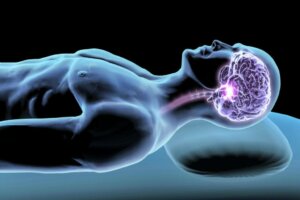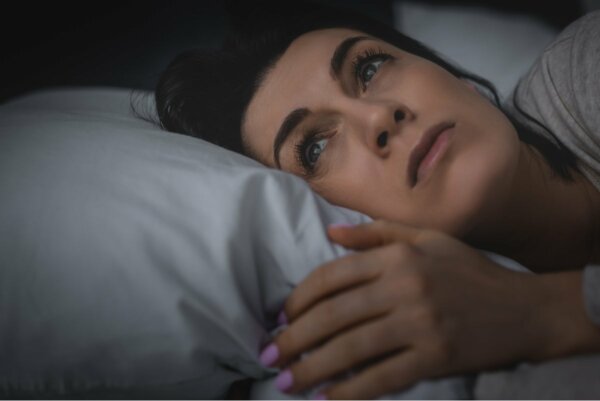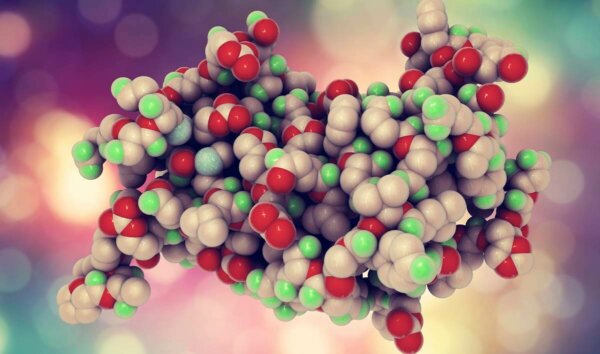Sleep Hormones: Mediating Agents for a Good Night's Rest


Written and verified by the psychologist Valeria Sabater
Sleep hormones oversee and control rest and even our survival. Sometimes, we neglect the importance of our nightly rest and the array of metabolic processes that occur during these periods. We’re made up of a series of connections that require the harmony of circadian rhythms.
Light and darkness don’t only govern our behaviors and schedules. Each one of us has an internal clock that synchronizes a vast number of processes and biochemical and physiological activities that oversee our well-being.
Hormones, on the other hand, are those small mediating agents that activate essential mechanisms in our body’s balance.
These small molecules, produced by the endocrine system and that send messages to various parts of the body and help us regulate essential processes, are also essential for sleep. However, they’re also very sensitive to our lifestyle. A poor diet or even excessive exposure to cell phones and computers can completely alter their activity.
Keep in mind that poor sleep quality doesn’t only mean that you feel more exhausted in the morning. Sleep also boosts the immune response and helps the body fight off many different illnesses.

What are sleep hormones?
Here’s an interesting fact. The body secretes and circulates about 50 different types of hormones. Each one of them has a function and is secreted by a particular gland. As far as sleep hormones go, many of them fulfill different tasks in addition to getting the body ready for a good night’s sleep.
What we mean here is that their task isn’t only to allow us to get good rest. Some of them work in different ways, including hormones that reduce our appetite so that we don’t suddenly wake up hungry.
However, as we already pointed out, these molecules that are so decisive in our body’s balance, health, and well-being are also very sensitive to lifestyle. Stress is undoubtedly one of their worst enemies. Likewise, factors such as menstruation or menopause in women can also directly affect good rest.
Melatonin regulates rest cycles
If we had to name a crucial biological element to promote sleep, most of us would instantly think of melatonin. Indeed, this hormone, which is synthesized from tryptophan and produced in the pineal gland, is key to this process.
- Melatonin’s main function is to regulate sleep cycles.
- Exposure to light and darkness stimulates an area of the brain called the suprachiasmatic nucleus (SCN). Thus, when it begins to get dark, this region begins to send commands to release melatonin to promote sleep.
- However, when it’s daytime, cortisol levels rise and melatonin is reduced in order to favor alertness and activity.
- Nevertheless, activities such as watching TV shows or spending many hours on a cell phone also increase cortisol levels, which keeps us from falling asleep.
Triiodothyronine balances metabolism to aid sleep
Triiodothyronine is an extremely important thyroid hormone for the body to control our metabolism. For example, one of its many functions is regulating body temperature and heart rate. Thus, when night comes, we need temperature to be reduced, as well as heartbeat. This way, we enter into a proper state of calm and relaxation.
On the other hand, we know that people with thyroid disorders suffer from sleep disorders.
Renin, an enzyme that regulates blood pressure
Renin is an enzyme secreted by some kidney cells. They have the function of promoting the water balance in our body’s salts. However, its importance during the night is also decisive because it helps to regulate blood pressure.
Studies like the one conducted at the Hospital Clínic of Barcelona, Spain, show that an alteration in this enzyme could produce nocturnal hypertension and, consequently, insomnia.

Orexins
Orexins are two different types of neuropeptide hormones that come from a common precursor protein: prepro-orexin. They fulfill various functions such as appetite regulation or the secretion of sexual hormones. Nevertheless, we also know that they’re decisive in sleep-wake cycles.
Thanks to them, we can pass from one state to another in a normal way. This means that, when it’s time to wake up, they activate us through dopamine, and, when it’s time to rest, they work together with the rest of the biochemical processes to promote rest.
Also, experts have seen that an alteration in orexins can produce narcolepsy (sudden and uncontrollable sleep in unexpected moments).
Sex hormones also facilitate our nightly rest
When we talk about sleep hormones, we wouldn’t normally refer to progesterone, estrogen, or testosterone. However, these hormones also have an impact on our nightly rest, and any change in them implies an alteration in our sleep patterns.
- It’s important to emphasize that, during a woman’s premenstrual phase, one of the most common hormonal changes is the sudden reduction of progesterone levels.
- This affects the body’s temperature and results in less REM sleep.
- On the other hand, during menopause, there’s a drop in progesterone production, which also causes insomnia.
In the case of men, experts have observed that low testosterone levels reduce sleep quality and alter sleep patterns.
It’s fascinating to see how all these enzymes and complex molecules in our bodies orchestrate the necessary physiological balance that governs our welfare without us even knowing it. As we’ve seen, sleep hormones do a lot more than favor good sleep. They’re also vital for our very health.
Sleep hormones oversee and control rest and even our survival. Sometimes, we neglect the importance of our nightly rest and the array of metabolic processes that occur during these periods. We’re made up of a series of connections that require the harmony of circadian rhythms.
Light and darkness don’t only govern our behaviors and schedules. Each one of us has an internal clock that synchronizes a vast number of processes and biochemical and physiological activities that oversee our well-being.
Hormones, on the other hand, are those small mediating agents that activate essential mechanisms in our body’s balance.
These small molecules, produced by the endocrine system and that send messages to various parts of the body and help us regulate essential processes, are also essential for sleep. However, they’re also very sensitive to our lifestyle. A poor diet or even excessive exposure to cell phones and computers can completely alter their activity.
Keep in mind that poor sleep quality doesn’t only mean that you feel more exhausted in the morning. Sleep also boosts the immune response and helps the body fight off many different illnesses.

What are sleep hormones?
Here’s an interesting fact. The body secretes and circulates about 50 different types of hormones. Each one of them has a function and is secreted by a particular gland. As far as sleep hormones go, many of them fulfill different tasks in addition to getting the body ready for a good night’s sleep.
What we mean here is that their task isn’t only to allow us to get good rest. Some of them work in different ways, including hormones that reduce our appetite so that we don’t suddenly wake up hungry.
However, as we already pointed out, these molecules that are so decisive in our body’s balance, health, and well-being are also very sensitive to lifestyle. Stress is undoubtedly one of their worst enemies. Likewise, factors such as menstruation or menopause in women can also directly affect good rest.
Melatonin regulates rest cycles
If we had to name a crucial biological element to promote sleep, most of us would instantly think of melatonin. Indeed, this hormone, which is synthesized from tryptophan and produced in the pineal gland, is key to this process.
- Melatonin’s main function is to regulate sleep cycles.
- Exposure to light and darkness stimulates an area of the brain called the suprachiasmatic nucleus (SCN). Thus, when it begins to get dark, this region begins to send commands to release melatonin to promote sleep.
- However, when it’s daytime, cortisol levels rise and melatonin is reduced in order to favor alertness and activity.
- Nevertheless, activities such as watching TV shows or spending many hours on a cell phone also increase cortisol levels, which keeps us from falling asleep.
Triiodothyronine balances metabolism to aid sleep
Triiodothyronine is an extremely important thyroid hormone for the body to control our metabolism. For example, one of its many functions is regulating body temperature and heart rate. Thus, when night comes, we need temperature to be reduced, as well as heartbeat. This way, we enter into a proper state of calm and relaxation.
On the other hand, we know that people with thyroid disorders suffer from sleep disorders.
Renin, an enzyme that regulates blood pressure
Renin is an enzyme secreted by some kidney cells. They have the function of promoting the water balance in our body’s salts. However, its importance during the night is also decisive because it helps to regulate blood pressure.
Studies like the one conducted at the Hospital Clínic of Barcelona, Spain, show that an alteration in this enzyme could produce nocturnal hypertension and, consequently, insomnia.

Orexins
Orexins are two different types of neuropeptide hormones that come from a common precursor protein: prepro-orexin. They fulfill various functions such as appetite regulation or the secretion of sexual hormones. Nevertheless, we also know that they’re decisive in sleep-wake cycles.
Thanks to them, we can pass from one state to another in a normal way. This means that, when it’s time to wake up, they activate us through dopamine, and, when it’s time to rest, they work together with the rest of the biochemical processes to promote rest.
Also, experts have seen that an alteration in orexins can produce narcolepsy (sudden and uncontrollable sleep in unexpected moments).
Sex hormones also facilitate our nightly rest
When we talk about sleep hormones, we wouldn’t normally refer to progesterone, estrogen, or testosterone. However, these hormones also have an impact on our nightly rest, and any change in them implies an alteration in our sleep patterns.
- It’s important to emphasize that, during a woman’s premenstrual phase, one of the most common hormonal changes is the sudden reduction of progesterone levels.
- This affects the body’s temperature and results in less REM sleep.
- On the other hand, during menopause, there’s a drop in progesterone production, which also causes insomnia.
In the case of men, experts have observed that low testosterone levels reduce sleep quality and alter sleep patterns.
It’s fascinating to see how all these enzymes and complex molecules in our bodies orchestrate the necessary physiological balance that governs our welfare without us even knowing it. As we’ve seen, sleep hormones do a lot more than favor good sleep. They’re also vital for our very health.
All cited sources were thoroughly reviewed by our team to ensure their quality, reliability, currency, and validity. The bibliography of this article was considered reliable and of academic or scientific accuracy.
- Boutin, J.; Audinot, V.; Ferry, G. y Delagrange, P. (2005). “Molecular tools to study melatonin pathways and actions.”. Trends Pharmacol Sci 26(8): 412-9.
- Mong, J. A., Suchecki, D., Semba, K., & Parry, B. L. (2010). Sleep and the endocrine brain. International Journal of Endocrinology. https://doi.org/10.1155/2010/967435
- Pascual-Leone, A. M. (2004). Eje cerebro-intestinal: orexinas. In Anales de la Real Academia Nacional de Farmacia (Vol. 70, No. 4).
This text is provided for informational purposes only and does not replace consultation with a professional. If in doubt, consult your specialist.







